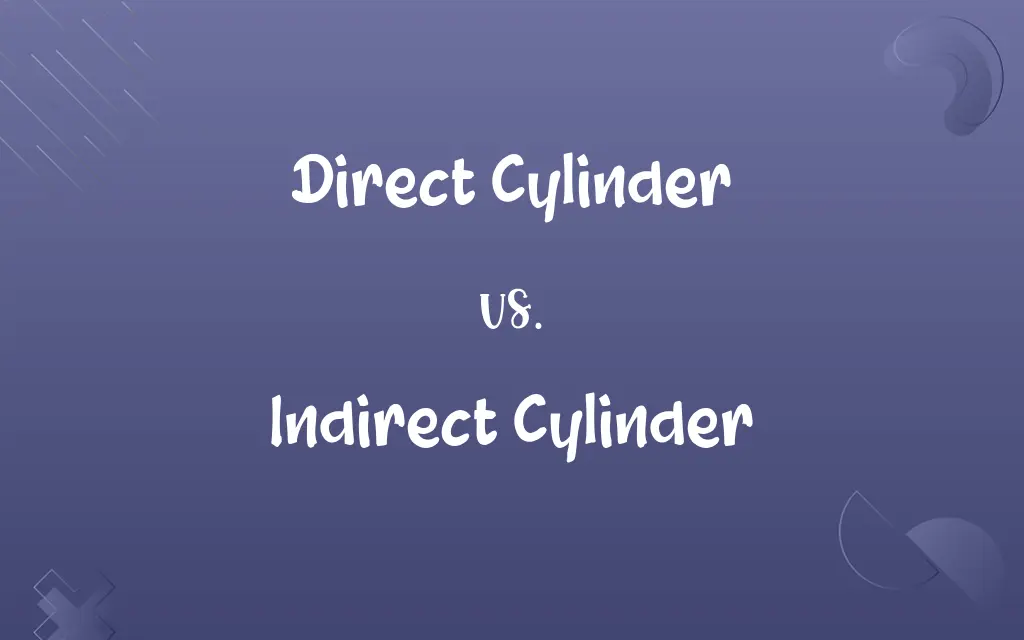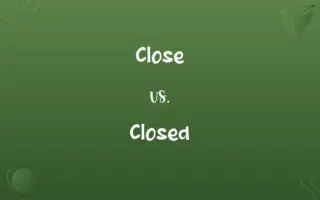Direct Cylinder vs. Indirect Cylinder: Know the Difference

By Hifza Nasir & Dua Fatima || Published on March 20, 2024
A direct cylinder heats water directly within the unit using an internal element or immersion heater, while an indirect cylinder uses an external heat source, like a boiler or solar panels, to heat the water through a coil inside the cylinder.

Key Differences
Direct cylinders are self-contained units where water is heated by an immersion heater inside the cylinder. This method is straightforward and efficient for properties where heating water directly within the cylinder is the most viable option, such as in homes without a central heating system. Indirect cylinders, on the other hand, are connected to an external heat source. Water circulates through a coil within the cylinder, transferring heat from the boiler or solar heating system to the water stored inside. This setup is common in homes with a central heating system, allowing the same heat source to provide both space heating and domestic hot water.
Dua Fatima
Mar 20, 2024
Indirect cylinders often come with the advantage of being able to integrate multiple heat sources, such as combining boiler heating with solar thermal panels, offering a more versatile and potentially energy-efficient solution. Direct cylinders, while simpler and typically less expensive to install, rely solely on electricity, which can be more costly than gas or solar options in the long run.
Hifza Nasir
Mar 20, 2024
The choice between direct and indirect cylinders largely depends on the existing heating system and the specific needs of the property. Direct cylinders provide a straightforward solution for hot water supply without the need for a separate heating system, making them ideal for electric-only homes or small apartments. Indirect cylinders, by integrating with the home's central heating, offer efficiency and the potential for reduced operational costs by using cheaper heating fuels like natural gas or renewable energy sources.
Hifza Nasir
Mar 20, 2024
Direct cylinders usually require less as they have fewer components and do not depend on an external heat source. Indirect cylinders, while potentially more complex due to their reliance on an external boiler or solar system, can offer significant energy savings and environmental benefits. Both systems need regular checks to ensure they are operating efficiently and safely, with indirect systems possibly requiring more attention due to the additional complexity of the external heating source.
Shumaila Saeed
Mar 20, 2024
Installation costs for direct cylinders are generally lower, given their simpler design and operation. Indirect cylinders, requiring integration with an external heating system, can be more costly upfront but may offer savings over time through more efficient energy use and the ability to use multiple heat sources.
Dua Fatima
Mar 20, 2024
ADVERTISEMENT
Comparison Chart
Heating Method
Uses an internal element or immersion heater
Heated externally via a coil by a boiler or solar panels
Dua Fatima
Mar 20, 2024
Energy Source
Typically electricity
Gas, oil, solar, or other central heating systems
Hifza Nasir
Mar 20, 2024
Operational Cost
Potentially higher due to electricity prices
Can be lower with efficient heating systems
Hifza Nasir
Mar 20, 2024
Maintenance
Simpler, as it's self-contained
More complex due to external heat source
Dua Fatima
Mar 20, 2024
ADVERTISEMENT
Efficiency
Efficient in electricity use but overall more expensive
Potentially more efficient with renewable energy sources
Dua Fatima
Mar 20, 2024
Suitability
Ideal for properties without central heating
Best for homes with a central heating system
Shumaila Saeed
Mar 20, 2024
Direct Cylinder and Indirect Cylinder Definitions
Direct Cylinder
Less complex installation and maintenance.
Installing a direct cylinder is straightforward, requiring only an electrical connection.
Shumaila Saeed
Feb 27, 2024
Indirect Cylinder
Offers potential energy savings over direct systems.
Indirect cylinders can be more economical, especially with a high-efficiency boiler.
Dua Fatima
Feb 27, 2024
ADVERTISEMENT
Direct Cylinder
Heats water internally with an electric element.
A studio apartment uses a direct cylinder for its hot water needs.
Dua Fatima
Feb 27, 2024
Indirect Cylinder
Uses an external heat source to warm water.
A family home uses an indirect cylinder connected to the gas boiler.
Dua Fatima
Feb 27, 2024
Direct Cylinder
Simple and standalone hot water solution.
Direct cylinders are common in electrically heated homes.
Hifza Nasir
Feb 27, 2024
Indirect Cylinder
Requires more complex installation.
Setting up an indirect cylinder involves connecting it to the household's heating system.
Dua Fatima
Feb 27, 2024
Direct Cylinder
Relies on electricity, potentially increasing utility bills.
The immersion heater in a direct cylinder can be costly to run during peak times.
Hifza Nasir
Feb 27, 2024
Indirect Cylinder
Allows for the use of renewable energy sources.
Solar panels supplement the heating of water in an indirect cylinder.
Hifza Nasir
Feb 27, 2024
Direct Cylinder
Suitable for smaller properties or where gas is not available.
Direct cylinders offer an efficient hot water solution for remote cabins.
Hifza Nasir
Feb 27, 2024
Indirect Cylinder
Integrates with central heating for efficient operation.
Indirect cylinders can use the boiler for both heating and hot water.
Hifza Nasir
Feb 27, 2024
Repeatedly Asked Queries
Can indirect cylinders use solar power?
Yes, they can integrate with solar thermal systems to heat water, offering an environmentally friendly and cost-effective solution.
Dua Fatima
Mar 20, 2024
Can I switch from a direct to an indirect cylinder?
Yes, but it requires integrating the cylinder with an external heat source, which can involve significant changes to your heating system.
Hifza Nasir
Mar 20, 2024
Which is more energy-efficient, direct or indirect cylinders?
Indirect cylinders can be more energy-efficient, especially when connected to efficient boilers or renewable energy sources.
Dua Fatima
Mar 20, 2024
Are direct cylinders cheaper to run than indirect cylinders?
Not necessarily; while electricity is more expensive than gas, the overall cost depends on the efficiency of your heating system and the energy prices.
Hifza Nasir
Mar 20, 2024
Can I use an indirect cylinder without central heating?
It’s not practical, as indirect cylinders are designed to work with an external heat source like a boiler or solar panels.
Dua Fatima
Mar 20, 2024
Which is better for a large family?
An indirect cylinder might be better for a large family, especially if connected to an efficient and fast-replenishing heat source.
Hifza Nasir
Mar 20, 2024
Is one type safer than the other?
Both are safe when properly installed and maintained, though direct cylinders have simpler systems with potentially fewer points of failure.
Hifza Nasir
Mar 20, 2024
Which system is better for a new home?
It depends on the home’s heating system. Indirect cylinders are typically better for homes with central heating, while direct cylinders suit electric-only homes.
Shumaila Saeed
Mar 20, 2024
What's the lifespan of direct vs. indirect cylinders?
Both types have similar lifespans, but this can vary based on maintenance, quality, and usage patterns.
Hifza Nasir
Mar 20, 2024
Do both types provide instant hot water?
Neither provides instant hot water; they store heated water, but indirect systems may heat water more quickly if connected to a powerful heat source.
Hifza Nasir
Mar 20, 2024
Share this page
Link for your blog / website
HTML
Link to share via messenger
About Author
Written by
Hifza NasirCo-written by
Dua Fatima
































































